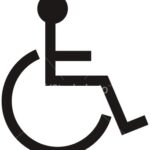Research conducted on Advocacy Action for Minimum National Physical Accessibility Standards has shown that the accessibility rate for People with Disabilities (PWDs) at both public and private facilities is only 15 percent.
According to the research, there are no national physical/structural standards to guide the construction of features such as rumps. Therefore, building contractors usually resort to improvisation in the construction of structural accessibility features.
The research was conducted by Smile Ghana, a service provider to a BUSAC Funded Project of the Ghana Society of People with Disability (GSPD), as part of a program to ensure that the Ghana disability Act as mainstreamed into national development policy and was unveiled at a sensitization and advocacy meeting, in Koforidua.
Other accessible features that the research looked at are door handles and washroom features at government departments, agencies and ministries, private institutions, hotels and schools at all levels which indicated that the plight of the PWDs remained a challenge since all those features were not favourable to them for use per their conditions.
The findings observed that in every 10 facilities sampled, only one could be used by a PWD without assistance while the remaining nine would require some level of assistance to enable people of such category to access them.
It noted that whiles the public institutions lacked heavily in the accessibility rate the hotels seemed to be doing better.
For instance the research found that most of the rumps constructed at public places to enable PWDs have access were either too steep or narrow and had surfaces that are polished or decorated with tiles that that made it slippery for a wheelchair or those using clutches.
Again most of the access rumps were constructed at the main entrances and exits only and therefore when a PWD is able to get to the facility internal circulation becomes difficult and therefore need to rely on others.
Apart from the rumps, doors at both private and public facilities were found to be heavy and so required strenuous effort to operate and door handles, locks and electrical fittings are located too high for wheelchair users in particular and PWDs in general.
The Disability Act was passed in 2005 by government to ensure that PWDs had equal access to national development agenda with a 10-year moratorium to help put the necessary infrastructure in place but the GSPD said it is worried that seven years down the line, infrastructure and their accessibility remained unchanged and even new buildings are not capturing the accessibility features for PWD.
Source: GhanaWeb













